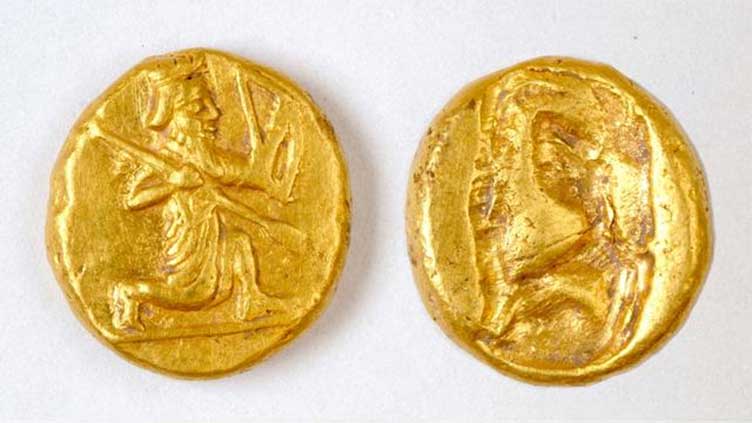Pot filled with gold coins buried by soldier 2,400 years ago discovered

WeirdNews
Archaeologists uncovered rare hoard of Persian gold coins in the ancient city of Notion in Turkiye
(Web Desk) - In a groundbreaking discovery, archaeologists have unearthed a pot of gold coins in the ancient seaside city of Notion in Turkiye.
This remarkable find offers unprecedented insights into a world 2,400 years ago during a period of significant political upheaval.
While excavating a house from the third century BC, archaeologists discovered an unexpected cache of riches intriguingly buried in its courtyard, according to The New York Times.
“The coins were buried in a corner of the older building,” stated archaeologist Christopher Ratté, a professor of classical studies at the University of Michigan, curator of the Kelsey Museum of Archaeology, and director of the Notion Archaeological Project.
“We weren’t actually looking for a pot of gold.”
Andrew Meadows, an Oxford University archaeologist, although uninvolved in the project, emphasized the significance of this find, describing it as “of the highest importance.”
He said no similar hoard has ever been discovered in Asia Minor.
“The archaeological context for the hoard will help us fine-tune the chronology of Achaemenid gold coinage.”
Depicting a Persian king kneeling with a bow and spear, the gold coins, known as darics, were primarily used to pay soldiers of fortune. This has led archaeologists to believe that the cache belonged to a mercenary who had to bury his gold for safekeepin
“According to the Greek historian Xenophon, a single daric was equivalent to a soldier’s pay for one month,” added Ratté, as reported by Live Science.
The substantial wealth stored in the small jug suggests the mercenary had participated in numerous battles in an area that frequently shifted between Persian and Grecian control.
The fact that the treasure was never recovered raises intriguing questions about the fate of its owner.
“Only the gravest misfortune can explain the preservation of such a treasure,” Ratté remarked. He also said, as reported by the Greek City Times, that the mystery mercenary hid the treasure between 430 and 427 BC.
In 545 BC, Achaemenid Persian Empire conquered the entire region by force. In 427 BC, Thucydides, a Greek historian, recounted the actions of an Athenian general, Paches, who killed pro-Persian mercenaries in Notion, according to the New York Times.
Seeped in conflict, two decades later, a historic naval battle occurred between Athens and Sparta off the coast, with the Athenians maintaining a naval base in Notion during a time characterized by clashes between pro-Persian mercenaries and Athenian forces, ultimately leading to their expulsion.
It might have simply been “the savings of a veteran mercenary soldier in a time and place when soldiers of fortune could make a lot of money if they were willing to risk their lives for the highest bidder,” Ratté continued. He further speculated that this likely marked the final stages of the soldier’s life.
“No one ever buries a hoard of coins, especially precious metal coins, without intending to retrieve it,” Ratte said in The University Record. He indicated that the owner could have been Greek, as many Greeks served as Persian mercenaries.
An archeological project spearheaded by the University of Michigan, Sinop University, and the Turkish Ministry of Culture and Tourism commenced excavations at this relatively unexplored 80-acre site on the border of Asia and Europe in 2022.
To date, the most well-preserved parts of the city date back to the Hellenistic period, between the third and first centuries BC. However, the house in the city center with a large courtyard implies that the site had been active earlier. The coins represent the latest and possibly the most exciting find.


